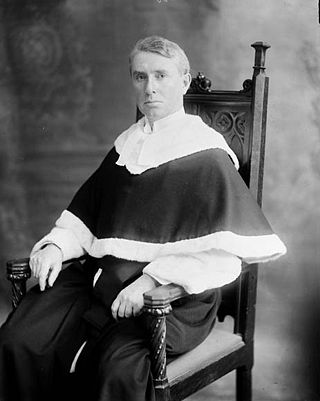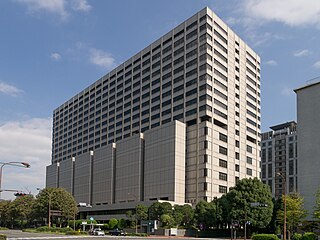Sri Lanka is a semi-presidential representative democratic republic, whereby the President of Sri Lanka is both head of state and head of government, and it relies on a multi-party system. Executive power is exercised by the President on the advice of the Prime Minister and the Cabinet of Ministers. Legislative power is vested in the Parliament. For decades, the party system was dominated by the socialist Sri Lanka Freedom Party and the conservative United National Party. The Judiciary is independent of the executive and the legislature.

A judge is a person who presides over court proceedings, either alone or as a part of a panel of judges. A judge hears all the witnesses and any other evidence presented by the barristers or solicitors of the case, assesses the credibility and arguments of the parties, and then issues a ruling in the case based on their interpretation of the law and their own personal judgment. A judge is expected to conduct the trial impartially and, typically, in an open court.

The Government of Sri Lanka (GoSL) is a Semi-presidential republic determined by the Sri Lankan Constitution. It administers the island from both its commercial capital of Colombo and the administrative capital of Sri Jayawardenepura Kotte.

A justice of the peace is a judicial officer of a lower or puisne court, elected or appointed by means of a commission to keep the peace. In past centuries the term commissioner of the peace was often used with the same meaning. Depending on the jurisdiction, such justices dispense summary justice or merely deal with local administrative applications in common law jurisdictions. Justices of the peace are appointed or elected from the citizens of the jurisdiction in which they serve, and are usually not required to have any formal legal education in order to qualify for the office. Some jurisdictions have varying forms of training for JPs.

The term magistrate is used in a variety of systems of governments and laws to refer to a civilian officer who administers the law. In ancient Rome, a magistratus was one of the highest ranking government officers, and possessed both judicial and executive powers. In other parts of the world, such as China, a magistrate was responsible for administration over a particular geographic area. Today, in some jurisdictions, a magistrate is a judicial officer who hears cases in a lower court, and typically deals with more minor or preliminary matters. In other jurisdictions, magistrates are typically trained volunteers appointed to deal with criminal and civil matters in their local areas.

Court dress comprises the style of clothes and other attire prescribed for members of courts of law. Depending on the country and jurisdiction's traditions, members of the court may wear formal robes, gowns, collars, or wigs. Within a certain country and court setting, there may be many times when the full formal dress is not used. Examples in the UK include many courts and tribunals including the Supreme Court of the United Kingdom, and sometimes trials involving children.

High court is a name for a variety of courts, often with jurisdiction over the most serious issues.
A puisne judge or puisne justice is a dated term for an ordinary judge or a judge of lesser rank of a particular court.
Joseph Francis Anthony Soza was a former judge of the Supreme Court of Sri Lanka. He has been described as "an outstandingly independent judge" who "turned out to be a fearless and vocal defender of the rights of victimized people."

There are various levels of judiciary in England and Wales—different types of courts have different styles of judges. They also form a strict hierarchy of importance, in line with the order of the courts in which they sit, so that judges of the Court of Appeal of England and Wales are given more weight than district judges sitting in county courts and magistrates' courts. On 1 April 2020 there were 3,174 judges in post in England and Wales. Some judges with United Kingdom-wide jurisdiction also sit in England and Wales, particularly Justices of the United Kingdom Supreme Court and members of the tribunals judiciary.

Anthony Harold Cumberland Thomas Gates was the chief justice of Fiji from 2008 to 2019. Justice Gates is best known for his decision in Chandrika Prasad v. Att-Gen of Fiji [2000] 2 FLR 89; Prasad v. Republic of Fiji & Another [2001] 1 LRC 665; [2001] NZAR 21 in which he held that the Constitution of Fiji had not been abrogated by the military intervention in 2000, and that the Constitution continued to be the law of the land. His decision was upheld by Fiji’s Court of Appeal, in February 2001. However, the decision which should have led to the restoration of the Parliament suspended by the coup of 2000 was not obeyed by the government at that time, the Government instead choosing to call for a vote in 2001.

The judiciary of India is a system of courts that interpret and apply the law in the Republic of India. India uses a common law system, first introduced by the British East India Company and with influence from other colonial powers and Indian princely states, as well as practices from ancient and medieval times. The constitution provides for a single unified judiciary in India.

A magistrates' court is a lower court where, in several jurisdictions, all criminal proceedings start. Also some civil matters may be dealt with here, such as family proceedings.
Joseph Asoka Nihal De Silva was the 42nd Chief Justice of Sri Lanka.

Shirani Bandaranayake, the 43rd Chief Justice of Sri Lanka, was impeached by Parliament and then removed from office by President Mahinda Rajapaksa in January 2013. Bandaranayake was accused of a number of charges including financial impropriety and interfering in legal cases, all of which she has denied. The impeachment followed a series of rulings against the government by the Supreme Court, including one against a bill proposed by Minister Basil Rajapaksa, President Rajapaksa's brother. Bandaranayake was replaced as chief justice by former Attorney General Mohan Peiris. Peiris is considered to be an ally of President Rajapaksa and his appointment is seen by critics as further consolidation of power by the president and his family. Bandaranayake refused to recognise the impeachment and lawyers groups refused to work with the new chief justice. Bandaranayake's controversial impeachment drew much criticism and concern from within and outside of Sri Lanka. On 28 January 2015 she was reinstated and retired on 29 January, the next day.
The legal system in Sri Lanka comprises collections of codified and uncodified forms of law, of many origins subordinate to the Constitution of Sri Lanka which is the highest law of the island. Its legal framework is a mixture of legal systems of Roman-Dutch law, English law, Kandian law, Thesavalamai and Muslim law. This mixture is a result of the diverse history of the island as a result criminal law is based on English law while much of the common law is Roman-Dutch law, with certain aspects such as marriage, divorce, and inheritance associated with Kandian law, Thesavalamai and Muslim law based on the community and geography.
The Judiciary of Sri Lanka are the civil and criminal courts responsible for the administration of justice in Sri Lanka. The Constitution of Sri Lanka defines courts as independent institutions within the traditional framework of checks and balances. They apply Sri Lankan Law which is an amalgam of English common law, Roman-Dutch civil law and Customary Law; and are established under the Judicature Act No 02 of 1978 of the Parliament of Sri Lanka.

Hojai District is a district in Assam, India. It was formed on 15 August 2015. The headquarters of the district is situated at Sankardev Nagar, which is about 8 km away from Hojai town. Hojai District was formed from three tehsils of Nagaon District, namely Hojai, Doboka and Lanka. Hojai was a part of undivided Nowgong district of then Assam Province.

Sarah Ann Leilani Merriam is an American attorney serving as a United States circuit judge of the United States Court of Appeals for the Second Circuit. She is a former United States magistrate judge of the United States District Court for the District of Connecticut and former district judge of the same court.

Doris Lenea Pryor is an American lawyer who has served as a United States circuit judge of the United States Court of Appeals for the Seventh Circuit since 2022. She served as a United States magistrate judge for the Southern District of Indiana from 2018 to 2022.













